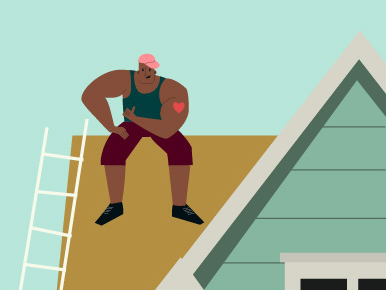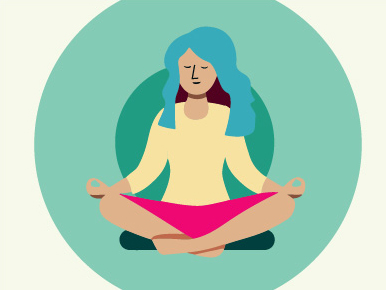The human body and mind are a source of wonder. With every study, researchers learn something new about how the brain works and what makes our body run.
Can you apply some of these recent research findings to your daily life?
A dog is a heart’s best friend
If you ever needed an extra reason to love dogs, here’s one. According to a Swedish study, owning a dog can help reduce cardiovascular risk, as they provide social support and motivation to take daily walks (rain or shine!).
Researchers examined Sweden’s national records and found that registered dog owners tended to have a lower rate of cardiovascular disease. What’s more, another Swedish study revealed that owning a dog reduced the mortality risk for heart-attack survivors by 15-33%.
Self-kindness works
A UK study confirmed that self-kindness brings mental and physical benefits.
Researchers from the Universities of Exeter and Oxford asked 135 healthy students to listen to different sets of audio instructions, and report how they were feeling.
Instructions that encouraged them to be kind to themselves led to feelings relaxation and safety, increased self-compassion and connection to others. On the other hand, recordings designed to make them self-critical accelerated heart rate and boost sweat – which are associated with stress and distress.
Researchers believe that, by switching off the threat response, self-kindness may also lower the risk of disease, as it boosts our immune system and give us the best chance of healing.
Don’t take light smoking lightly
A light smoking habit is only a bit less harmful than a heavier one, according to US research. A study published in The Lancet Respiratory Medicine found that smoking fewer than five cigarettes a day damages lungs two-thirds as much as smoking 30 or more.
To avoid further damage, the best way to go seems to quit entirely – and it could be good for the budget, too. If you took out personal risk insurance cover when you were a smoker, and quit for good for at least 12 months, you can request the insurer to switch you to non-smoker premiums (which could lower your premium by half, depending on other factors calculated into your premium.) Get in touch to learn more.
The power of a warm bedtime bath
Do you have trouble sleeping? According to US research, a warm bath or shower an hour or two before going to bed can help you fall asleep faster, because it lowers your core temperature. Our body tends to naturally cool down by evening time, and by taking a warm bath, we aid our natural circadian rhythm.
A photo a day keeps the doctor away
We all know that too much time spent on social media can affect our well-being negatively. But there’s one way it can help boost happiness, according to a UK study – and that’s if you take a photo each day and post it online.
Researchers found that taking a daily photo boosts well-being through mindfulness, self-care, community interaction, and the potential to create new memories. “It encourages people to look differently at the world around them, prompts them to go out of their routine ways and connects them with others more,” explained senior lecturer Dr Andrew Cox.
Midday napping reduces blood pressure
Yay to guilt-free napping! A Greek study found that people who took regular 30-minute naps were 37% less likely to pass away from heart disease over a six-year period than those who never napped. Experts explain this with the fact that sleep can act like a valve of stress release, reducing blood pressure and slowing heart rates, and giving the immune system time to shore itself up.
A decluttered room is a decluttered mind
If your cluttered home is stressing you out, you’re not alone. According to researchers at the DePaul University of Chicago, clutter does have an impact on emotional well-being. They found that clutter and procrastination are interconnected, and among older adults, clutter was also linked with reduced life satisfaction.
Never judge food by its label
Ghent University in Belgium revealed that food labels influence the perception of flavour. To investigate how health labels were perceived, researchers asked 129 people to sample four Gouda cheeses with different labels, and compare their taste. Interestingly, cheese with the ‘reduced salt’ tag was described as less salty, and many liked the ‘regular’ Gouda more than the ‘light’ one. Unbeknownst to them, it was always the same cheese.
The case for ‘healthy humility’
Daryl R. Van Tongeren, associate professor at Michigan’s Hope College, has come to the conclusion that virtues like humility and forgiveness can contribute to a flourishing life.
His theory is that, with an accurate view of our own biases, abilities and limitations, we can be more focused on others rather than ourselves. And this, in turn, can lead to better relationships, higher life satisfaction, and a willingness to learn and improve.
We’re in your corner
Here at LifeDirect, we’re all about helping people protect their personal and financial health. Looking for the right insurance for your needs? Our quote compare tool is a great place to start, and if you have any questions, you can talk to our friendly insurance advisers. Give us a call on?0800 800 400, start a Live Chat or?fill in our contact form?to contact us.
Disclaimer: Please note that the content provided in this article is intended as an overview and as general information only. While care is taken to ensure accuracy and reliability, the information provided is subject to continuous change and may not reflect current developments or address your situation. Before making any decisions based on the information provided in this article, please use your discretion and seek independent guidance.












